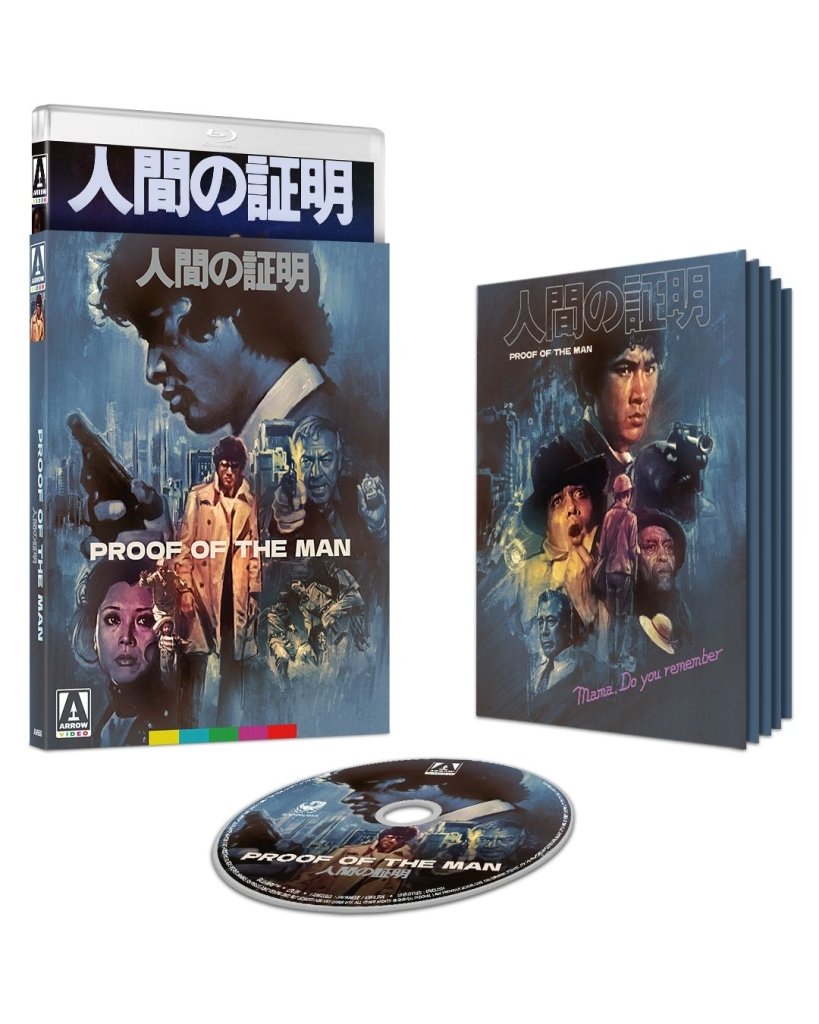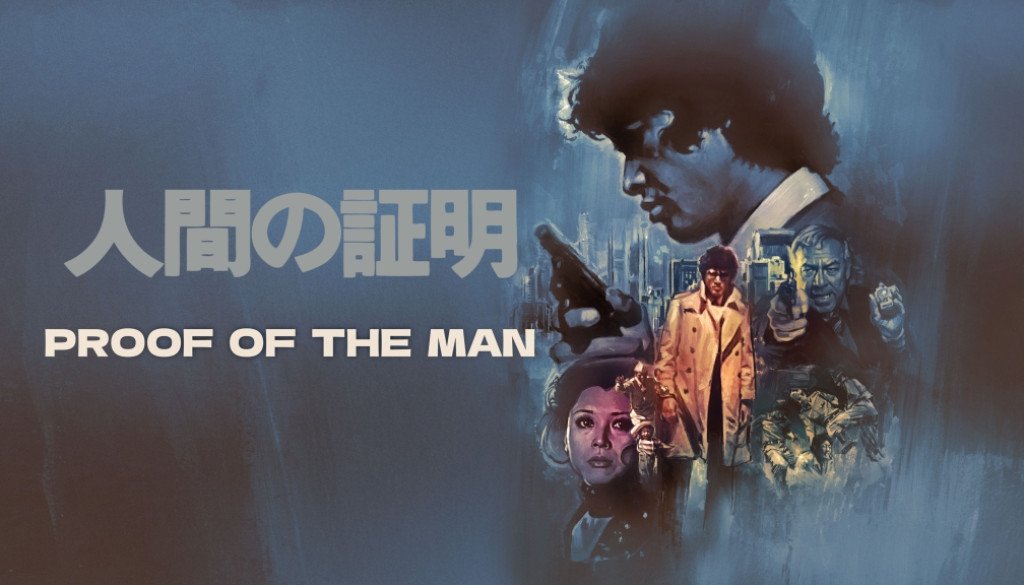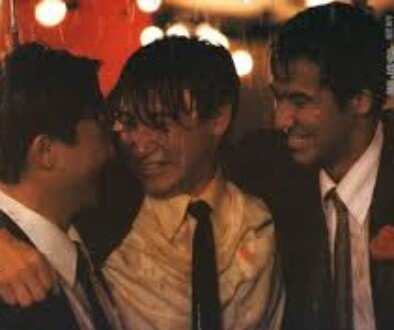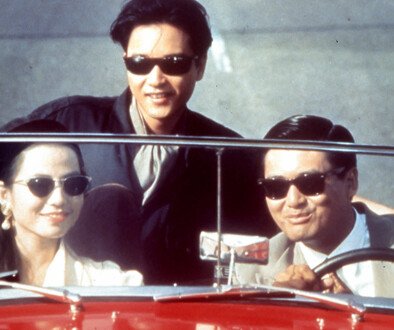Arrow Video Blu-Ray Review: In PROOF OF THE MAN, A Transcendant Masterpiece
To say that producer Haruki Kadokawa’s second studio feature release in 1977 is an interesting watch doesn’t quite do it justice. Otherwise, if it gets your attention, then who am I to argue? Right?
Proof Of The Man, directed by Junya Sato and based on an in-house novel by Seiichi Morimura, is a spellbinding two-hour-plus cop procedural that covers a lot of ground for its duration. It starts off with an American man (Joe Yamanaka) who sets out to Japan after claiming a wad of cash only to end up getting stabbed and dying in the elevator of a luxury hotel. That same evening, a woman is killed in a hit-and-run by an assailant and his accomplice who then collect her body from the road in a hapless effort to cover up the crime.
We soon meet Detective Munesune (Yusaku Matsuda), initially tasked alongside his partner with investigating the American’s death. Between the stabbing victim’s mixed ethnic background, a book of poems and the faint mention of a straw hat, Munesune’s investigation eventually finds its way to Kyokyo Yasugi (Mariko Okada), a highly successful fashion designer currently curating a monthlong fashion show who herself denies any culpability or connection with the crimes.
To say the least, Munesune’s tenacity eventually sees him trekking to New York City where he is soon partnered with Detective Shuftan (George Kennedy), as they make their way to beat the streets of Harlem where the American lived prior. Unraveling an epic tale of wartime atrocity, family drama and corruption, generational trauma, and racial reckoning, it’s only a matter of time until Munesune’s case eventually wraps, culminating a pursuit of justice much closer than he intially realized.
I saw this film and instantly thought of some of the East-meets-West titles I’d seen over the years that never really touched on the kind of intrinsic messaging that this film explores. The greatest impact here comes from the perspective – as its told – from Munesune, who often veers into old memories of a childhood beleagured by past tragedy, and with a film that sees him piecing things together in almost real time.
I was also pretty surprised to see Kennedy in this film, someone who I was at once familiar with via The Naked Gun trilogy growing up. It was interesting seeing just how his role would play opposite Matsuda in a story that weaves its way into a chapter featuring two cops from opposite sides of the globe working to solve a case – At least that’s what you would get from a looser recounting of this film, whereas in watching, you’ll start to feel like the impending fallout is more ominous than imagined.
Proof Of The Man is the kind of film I didn’t read too much into going into the material. I got the check disc in the mail a long while after requesting it and noticing Matsuda on the cover of the upcoming Blu-Ray from Arrow Video. Little did I know just how much this film would speak to me, especially as someone who has faced to racism and bullying for most of my childhood as a mixed kid with braids.
Director Sato, in pairing with screenwriter Zenzo Matsuyama, connects with viewers in a timeless tale that bristles with an enduring sense of cross-cultural luminescence and awakening that lingers to this day. In this essence, and at least from this critic’s POV, Proof Of The Man stands evidentiary to more than one in this movie.
Sato’s application of Matsuyama’s adaptation is impressive, especially for the kind of film whose target market is seldom set in places like New York City in the 1970s. Par for the course are some of the inevitable tropes that stem from profiling locales like Harlem, a neighborhood that has not only seen its share of urban and political decay, but has also lived and grown, and maintained itself as a cultural epicenter for black and brown history and posterity.
It was endearing to see this kind of inclusion in a Showa-era Japanese production, as much as it is sometimes seeing black characters featured in other films in the same era, albeit not necessarily in the same volume. Additionally, that Matsuda would go on to return to “The Big Apple” a little over a dozen years later to film opposite Michael Douglas and fellow industry stalwart Ken Takakura is another fascinating factoid worth noting as you dive into this film.
Directors like Sidney Lumet, William Friedkin and Sydney Pollack come well-packaged in the film’s marketing for fans of sprawling crime films, in addition to Sato’s oeuvre and the like. Fans of Showa-era cinema will also find celebrated actor Toshiro Mifune in a peculiar role that departs from his usual protagonistic persona.

Asian American film scholar Rob Buscher and DJ Skeme Richards discuss these aspects of Proof Of The Man and much more in the film’s commentary which I partly listened to. They go plentily into the cast and crew, as well as the film’s cross-continental setting as a contributor to its lasting impact in cinema, and they’re also keen on pointing out the intricacy and detail of the film’s opening sequences pertinent to Okada’s role, citing the costumes and choreography that lend depth and substance to her character development.
We also have film expert Earl Jackson whose “Taking The Big Apple” video essay delivers a twenty-minute look into the film, its director, and the history of the film’s production. One thing I especially found interesting here that Jackson talks about – aside from actor Yamanaka’s background – is Matsuda’s own origins. There is a common denominator here that sort of feels like a prospective alignment of talents – one that brings into crucial and critical focus the topical subject matter of identity and self-discovery amid social disparity in a post-war era, as well as – and in the case of Proof Of The Man – criminal upheaval and wrongdoing.
Much more of the history of this film is explored in a half-hour discussion between Junya Sato biographers Tatsuya Masuto and Masaaki Nomura in “A Japanese Blockbuster”. I watched a portion of this and loved how they dove into some of the casting processes involved; Several well knowns were circled for the role of Shuftan, as well as for Munesune (see my aforementioned passage on this film’s proximity to Matsuda’s return to New York City). There was also some frictious moments during production, particularly between Sato and the film’s cinematographer, Shinsaku Himeda, and they also go into the film’s massive marketing which they claimed upset some people as it gave the impression that more was spent on promotion than the film’s actual budget.
The Arrow Video LE Blu-Ray release of Proof Of The Man finishes out its special features with a quartet of teaser trailer materials, and a photo gallery of stills from the movie. The movie itself is presented in 1080p High-Definition with a Japanese and English lossless mono audio track, and optional newly translated English subtitles.
Find Proof Of The Man at Arrow Video or the MVD Shop, or wherever specialty label Blu-Rays are sold.
Native New Yorker. Been writing for a long time now, and I enjoy what I do. Be nice to me!





